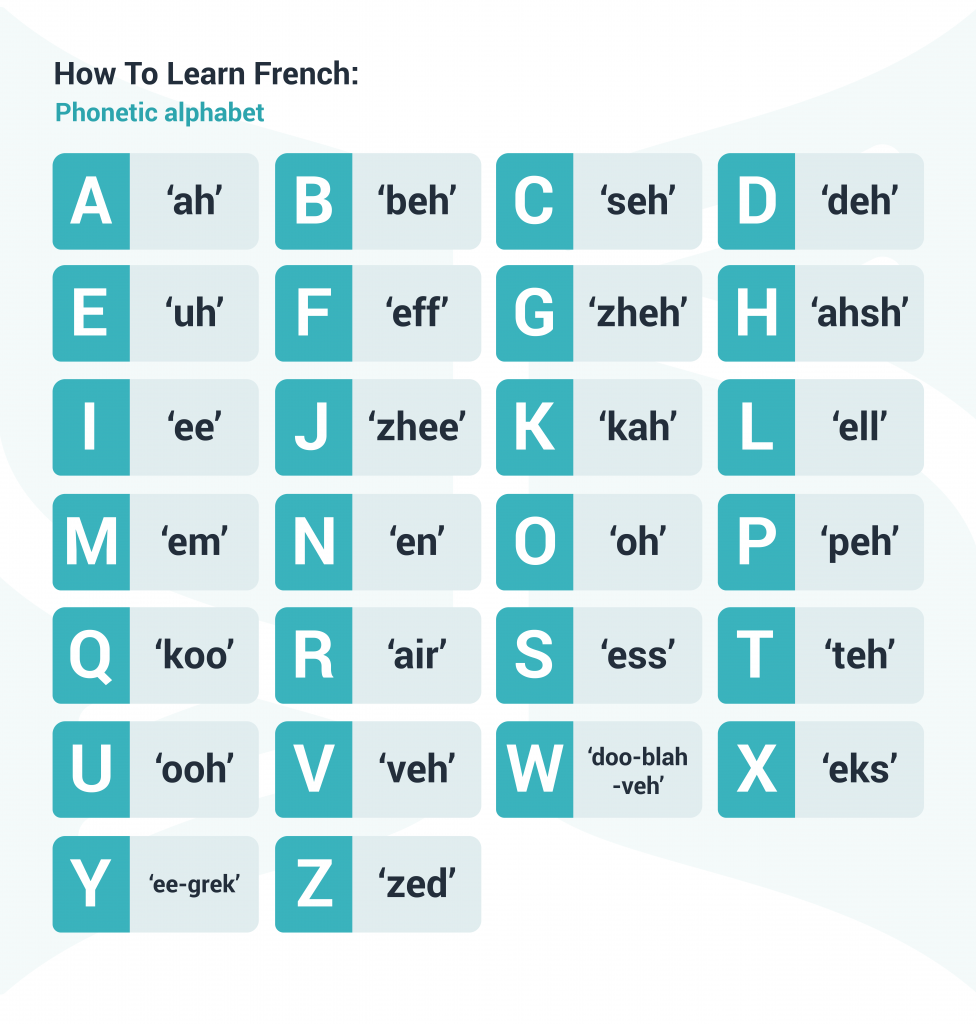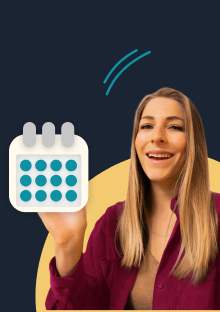Easy Languages to Learn for French Speakers

The French language has an undeniable elegance to it, especially in the way it sounds. However, many beginners find it challenging to master because of issues like grammar and spelling complexity.
In this article, we have broken down how to learn French in 10 simple steps that you can follow even if you're on a busy schedule. So, keep reading and start your French language journey below. Allez!
Step 1. Start by learning French sounds
The French alphabet has the same letters as English , and over 28% of English words have French origin . That's more than any other language. This makes it one of the easiest languages to learn for English speakers . However, there is the exception that certain letters have accents.
As you can see from the table below, they are pronounced differently from English letters too. As you learn French , it's essential to pay attention to the sounds, not to the letters.
There are 23 consonants and 16 vowel sounds in French. If you are an English speaker , you already know 20 consonants and 6 vowels. So, you are left with 3 new consonants and 10 vowels to learn.
Familiarizing yourself with the French alphabet and the sounds of each letter is crucial. If you haven't already started studying French sounds, you now have some homework for the rest of the day.

Step 2. Start speaking French (now)
You might feel uncomfortable the first time you try speaking French, but getting used to it and slowly building your confidence is a vital early step.
We recommend the following steps to improve your speaking skill:
Get a French tutor
While passive and active listening are easy to include in everyday life, talking to native speakers is much harder to do. With Preply, you can book 1-on-1 French lessons with native tutors . This will give you experience in listening, having a real-life French conversation , and practicing your speaking skills.
Find a language exchange
With language exchange apps , you get matched with native French speakers who will teach you their language, and in exchange, you'll teach them yours. If you make friends with your language exchange partner, they can become an informal French teacher and you both benefit.
This is a good option if you are on a budget, as exchanges are free and often French courses can be expensive. However, language exchanges can be unstructured and difficult to make progress with, so working with a "real" tutor is always preferable.
Seek French culture
Look for local French cultural centers and communities and find ways to join their activities. Start French courses in art, music, or any other pastime you're interested in. If you're developing a skill or starting a new hobby, why not do it in French?
Also, make the most of French food and drinks. Ask yourself: are there local bars and restaurants where I can practise my French? If there is, take advantage. You may have some tricky moments at first, but persist, and you will be communicating effectively in no time.
Step 3. Read in French
It's almost impossible to master a language without embracing literature. Even if you can't handle Proust or Hugo at the moment, it doesn't mean you should ignore reading in French altogether.
Ask a range of experts for their tips on learning French, and they will be in agreement — beginners should start small, with simple, easy-to-understand books. We recommend the following:
- "Le Petit Prince" de Antoine de Saint-Exupéry
- "Mon père est femme de ménage" de Saphia Azzeddine
- "Le Petit Nicolas" de René Goscinny
Another great tip is to look for books whose plots you know well already (such as Harry Potter) and try to read them in French.
You can also read news in French or subscribe to newsletters. We recommend this French language newsletter that sends new, free content daily.
Step 4. Pay special attention to audio
If you reach a high reading comprehension level, you still might find yourself confused when someone speaks to you in French. This is because the differences between written French and spoken French are so significant they can appear like two different languages.
That's why it's essential to include listening in your French learning routine. Reading is a fun and convenient way to enrich your French vocabulary, but it won't necessarily help you understand the lady in the patisserie shop.
There are plenty of ways to engage with spoken French online, including:
- Check out Bien Dire for audio recordings of native French speakers in conversation.
- Listen to French podcasts . We recommend Coffee Break French for beginners.
- Listen to French music by searching for playlists you like on Spotify , Apple Music, or your favorite Youtube channels .
- Listen to audio books. Look for French language versions of your favorite books on Audible or rent them from your local library (if available).
- Explore YouTube. Think about the kind of videos you usually watch (e.g. interior design, personal development, vlogs) and then find French YouTubers that create videos on those topics. This way you'll learn natural, modern French. Stephen Krashen, an expert in linguistics, proposes that to learn a new language, the content needs to be understandable enough that we get the "gist" of it (even if some concepts remain beyond our grasp). So if you don't understand after the first few minutes, look for something else.
- Find YouTubers who dedicated their channels to learning French. Our favorites are innerFrench (more suitable for intermediate to advanced learners) and Piece of French (beginner to intermediate learners).
Step 5. Watch Movies and TV in French
Movies are an excellent tool for learning foreign languages . If you love watching movies in your free time, why not watch them in French? This activity will help you better understand the communication patterns of the language and get a grasp of the culture. An additional benefit of watching French movies is that they stimulate your brain to think in French.
We recommend you watch movies with French subtitles at first, but try turning them off after time so you can improve your listening and comprehension without relying on reading. Also, don't hesitate to pause, take notes, and repeat some phrases. This comprehensive list of movies for learning French will come in handy.
Pro tip: While it may be tempting to deep dive into original French TV series and movies, it might be easier to start with English language movies you know already that have been dubbed in French (a common practice in France ). This is so that you don't have to worry about following the plot while understanding the French.
Step 6. Consider basic pronunciation rules
French pronunciation can be confusing for beginners. First of all, the language has sounds that don't exist in English. Additionally, it has many intricacies, like one letter having multiple sounds and exceptions to standard rules.
You might understand if someone asks you 'Parlez-vous français ?'; however, your pronunciation needs to be good to hold a real French conversation and be understood.
Here is a brief overview of the general rules of pronunciation to get your started on your French language learning journey :
- All vowels in a word need to be pronounced, whereas in English native speakers "swallow" (don't pronounce) some vowels. For example, the phrase "do you know what I mean?" is pronounced as "due know what I mean?" The "do" and the "you" are reduced to one sound. This does not happen in French.
- Part of the charm of French is in its stress. Unlike English , where stress may fall on any syllable, in French, it's always on the last pronounced syllable. As you teach yourself French, we advise taking a look at this Youtube video on French syllable stress .
- If a word ends with a consonant and the next begins with a vowel or a silent "h" then the final consonant joins the following vowel.
So, how can you learn French online on your own if the sounds and pronunciations are so difficult to master? The best way is to find a comprehensive guide on letter combinations and sounds and memorize the rules. Tongue twisters are also a fun way to perfect your pronunciation.
And of course, learning other skills like speaking and listening will have a big impact on your French pronunciation.
Step 7. Activate your vocabulary by learning French words and phrases
One of the most important things to do when you start learning French is to understand basic vocabulary, phrases, and numbers. Beginners usually start practicing words that will help them when meeting French people , ask basic questions, and introduce themselves. Using flashcards will also help you to remember French phrases that you've previously learned.
Don't know where to start? Take a look at these useful phrases for greeting people in French .
Greetings and useful phrases:
- Bonjour ! (bohn-jhoor) — Hello!
- Bonsoir ! (bohN-swahr!) — Good evening!
- Au revoir ! (ohr-vwahr!) — Goodbye!
- S'il vous plaît.(seel vooh pleh.) — Please.
- Je vous en prie. (zhuh vooh-zahN pree.) — You're welcome!
- Merci. (mehr-see) — Thank you.
- Pardon/Excusez-moi. (pahr-dohN/eks-kew-zey-mwah.) — Excuse me.
Useful questions to learn basic French:
- Est-ce que vous parlez anglais ? (ehs-kuh vooh pahr-ley ahN-gleh?) — Do you speak English ?
- Comment allez-vous ? (koh-mahN-tah-ley-vooh?) — How are you?
- Comment vous appelez-vous ? (koh-mahN vooh-zah-pley-vooh?) — What's your name?
- Quelle heure est-il ? (kehl uhr eh-teel?) — What time is it?
- Où est-ce que je peux trouver… ? (ooh ehs-kuh zhuh puh trooh-vey….?) — Where can I find . . .?
Step 8. Make lists of basic pronouns, nouns, and verbs
Building up your French vocabulary starts with basic words. Learning them will let you talk about people, places, and things around you. It's impossible to form a sentence without a verb, so a good place to start is with common French verb conjugations .
Another approach is to categorize different word types by topic and create targeted lists. This way, you will learn one topic and word type at a time, which is a proven and effective method of learning new words . For example, you could start with learning pronouns:
- je — I
- tu — you (informal)
- il — he
- elle — she
- on — we (informal)
- nous — we
- vous — you plural/formal form
- ils — they (masc.)
- elles — they (fem.)
Pay attention to French numbers too. You will need them for shopping, money exchange, and transportation when traveling to France . Learning basic French verbs, nouns, and numbers as soon as possible is important as they will allow you to immerse yourself and start talking to people right away.

Workshop: Build your personal study plan (and stick to it)
Join our live workshop with YouTuber and language coach Lindie Botes to create your personal language study plan, and stick to it in 2022.
- Register now
Step 9. Master basic grammar rules
Learning essential words is an important first step you must make on your path to becoming fluent. It is also necessary to structure sentences properly by using correct grammar. There is no single, easy way to learn French grammar, but we recommend you start with these rules:
- Gender of nouns . A noun is either masculine or feminine. Understanding how this works and the patterns to look out for is worthwhile.
- The use of articles. French has the articles "la" for feminine nouns and "le" for the masculine; "l'" is also used when the following noun starts with a vowel. There are also indefinite articles "un" and "une" for masculine and feminine nouns.
- Verb conjugation . French verbs change based on the subject in a sentence. There are standard "regular" rules and exceptions known as "irregular". Learning the rules for conjugation in regular verbs and a few of the most common irregular ones is a great starting point.
- Verb tenses. In French, there are 12 actively used verb tenses. Start by learning the present tense ("présent de l'indicatif"/"indicative present"), the past participles (used to make the past tense), and the irregular forms of future tense.
Step 10. Surround yourself with all things French
Engage with the French language as much as possible. The goal is to reach a level where you are thinking, joking, and even dreaming in French.
While language immersion is usually associated with moving abroad, there are ways in which you can immerse yourself in French even if you haven't booked that ticket to Paris just yet. For example:
- Change the default language of your phone, tablet, and computer to French.
- Download movies, series, audiobooks , and podcasts in French for easy immersion on the go. Even if you don't understand everything, there's still a lot of value, as passive listening is a big part of language immersion.
- When you're trying new recipes, look for them in French! Maybe you'll end up with an overly spiced curry or a dry banana bread, but the benefits to your French language learning will be numerous!
A brief afterword
Learning a language by yourself is challenging, but following the steps we set out will give you a great start. We recommend finding a professional tutor as soon as possible because they will help you study more effectively and, crucially, speak French regularly.
Speak French whenever you can and practice reading, listening, and writing too. We also suggest doing weekly recaps of what you've learned so it sticks in your mind and you stay motivated by seeing your progress.
With Preply, you can browse a database of qualified French tutors and choose one that suits you the most. So, what are you waiting for? Find the best French tutor for you on Preply and start your journey to French fluency today. Voilà!

Source: https://preply.com/en/blog/how-to-learn-french-step-by-step/

0 Response to "Easy Languages to Learn for French Speakers"
Post a Comment